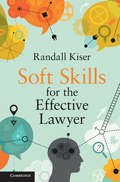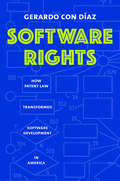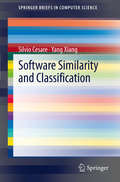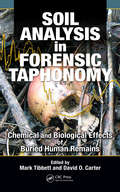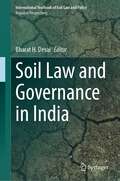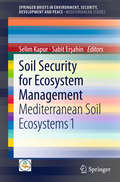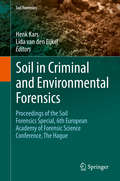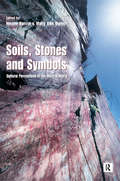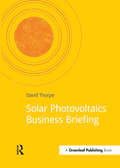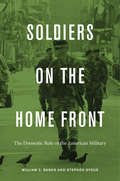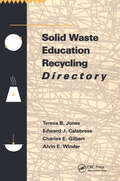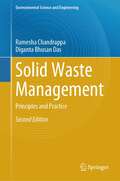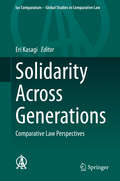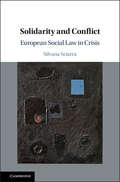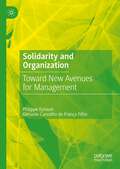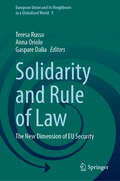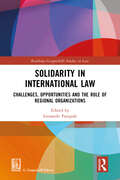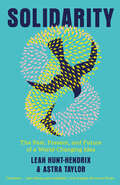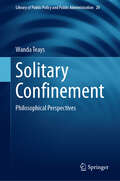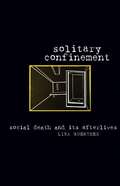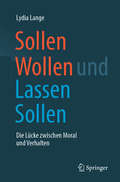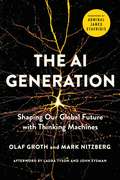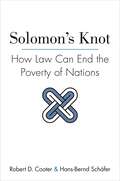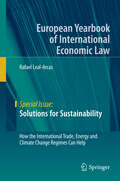- Table View
- List View
Soft Skills for the Effective Lawyer
by Randall KiserIn this groundbreaking book, Randall Kiser presents a multi-disciplinary, practice-based introduction to the major soft skills for lawyers: self-awareness, self-development, social proficiency, wisdom, leadership, and professionalism. The work serves as both a map and a vehicle for developing the skills essential to self-knowledge and fulfillment, organizational respect and accomplishment, client satisfaction and appreciation, and professional improvement and distinction. It identifies the most important soft skills for attorneys, describes and applies hundreds of studies regarding psychology, law, and soft skills, and provides concrete steps and methods to improve soft skills. The book should be read by law students, attorneys, and anyone else interested in how lawyers should practice law.
Software Rights: How Patent Law Transformed Software Development in America
by Gerardo Con DiazA new perspective on United States software development, seen through the patent battles that shaped our technological landscape This first comprehensive history of software patenting explores how patent law made software development the powerful industry that it is today. Historian Gerardo Con Díaz reveals how patent law has transformed the ways computing firms make, own, and profit from software. He shows that securing patent protection for computer programs has been a central concern among computer developers since the 1950s and traces how patents and copyrights became inseparable from software development in the Internet age. Software patents, he argues, facilitated the emergence of software as a product and a technology, enabled firms to challenge each other’s place in the computing industry, and expanded the range of creations for which American intellectual property law provides protection. Powerful market forces, aggressive litigation strategies, and new cultures of computing usage and development transformed software into one of the most controversial technologies ever to encounter the American patent system.
Software Similarity and Classification
by Yang Xiang Silvio CesareSoftware similarity and classification is an emerging topic with wide applications. It is applicable to the areas of malware detection, software theft detection, plagiarism detection, and software clone detection. Extracting program features, processing those features into suitable representations, and constructing distance metrics to define similarity and dissimilarity are the key methods to identify software variants, clones, derivatives, and classes of software. Software Similarity and Classification reviews the literature of those core concepts, in addition to relevant literature in each application and demonstrates that considering these applied problems as a similarity and classification problem enables techniques to be shared between areas. Additionally, the authors present in-depth case studies using the software similarity and classification techniques developed throughout the book.
Soil Analysis in Forensic Taphonomy: Chemical and Biological Effects of Buried Human Remains
by Mark Tibbett David O. CarterA burial environment is a complex and dynamic system. It plays host to an abundance of interdependent chemical, physical, and biological processes, which are greatly influenced by the inclusion of a body and its subsequent decay. However, while taphonomy continues to emerge as a valuable forensic tool, until now most of the attention has been on th
Soil Law and Governance in India (International Yearbook of Soil Law and Policy)
by Bharat H. DesaiThis curated book addresses, in the scholarly realm, the problems of soil degradation and provides some practical solutions for them to save soil life. It comprises ten specially invited chapters that address the global soil framework, soil challenges in India, existing policy, law and institutional framework as well as other perspectives.Soil is our biological capital. The soil health is critical for survival of the humans (and other life forms) since almost 95% of our food comes from it. It also has significant potential as a sink for carbon through sequestering. Excessive and inappropriate land use leads to various forms of land degradation that becomes contributing factor for hunger, migration and even wars. There are several multilateral environmental agreements (MEAs) including UN Convention to Combat Desertification (UNCCD) that hold relevance for addressing the global soil problematique. The UNCCD Strategic Framework (2018-2030) has declared desertification/land degradation and drought (DLDD) as “challenges of a global dimension”. As a result, sustainable soil management (SSM) has emerged as an important goal for attaining Sustainable Development Goals 2030 (SDGs 2030).In the backdrop of these globally ordained processes, India appears to be seriously pursuing the Land Degradation Neutrality (LDN) target within the framework of the UNCCD. As a corollary, India has set an ambitious goal of halting any further land degradation by 2030 and rehabilitate at least 30 million hectares of degraded wasteland, forest land and agricultural land.This ideational effort by eminent legal scholars, soil scientists and practitioners aim to promote concerted teaching and research in the field of soil law and governance in the University Faculties of Law, National Law Schools, Institutions of Eminence and other legal and scientific bodies. The ‘seeds sown’ in the soil of knowledge through this effort will, hopefully, provide an impetus for more in-depth research concerning soil law and governance in India and beyond.
Soil Security for Ecosystem Management: Mediterranean Soil Ecosystems 1
by Sabit Erşahin Selim KapurThe term "Soil Security" is used in the context of maintaining the quality and quantity of soil needed in order to ensure continuous supplies of food and fresh water for our society. Topics in this unique book on the management of soil sustainability in the Mediterranean region include: soil information, land degradation, land desertification, pedoenvironments, and the carbon cycle and sequestration. One main focus of the book is the description of new approaches that have been adapted with regards to interdisciplinary soil ecosystem management to combat and mitigate desertification. The contributing authors are renowned experts in their fields which cover the subjects on traditional as well as innovative land use and management.
Soil in Criminal and Environmental Forensics
by Henk Kars Lida EijkelThis introductory volume to a new series on Soil Forensics gives a kaleidoscopic view of a developing forensic expertise. Forensic practitioners and academic researchers demonstrate, by their joint contributions, the extent and complexity of soil forensics. their reports exemplify the broad range of sciences and techniques applied in all stages of forensic soil examinations, from investigations at crime scenes to providing evidence that can be used in court proceedings. Moreover the necessity is depicted of co-operation as a condition for any work in soil forensics between scientists of different disciplines, but no less between scientists and law enforcers. Soils play a role in environmental crimes and liability, as trace evidence in criminal investigations and, when searching for and evaluating, buried human remains. This book shows soil forensics as practiced in this legal context, emerging and solidifying in many countries all over the world, differing in some respects because of differences in legal systems but ultimately sharing common grounds.
Soils Stones and Symbols Cultural Perceptions of the Mineral World: Archaeological And Anthropological Perspectives On The Mineral World
by Nicole Boivin & Mary Ann OwocEthnographic and archaeological records feature a rich body of data suggesting that understandings of the mineral world are in fact both culturally variable and highly diverse. Soils, Stones and Symbols highlights studies from the fields of anthropology, archaeology and philosophy that demonstrate that not all individuals and societies view minerals as commodities to be exploited for economic gain, or as passive objects of disembodied scientific enquiry. In visiting such diverse contexts as contemporary India, colonial-period Australia and prehistoric Europe and the Americas, the papers in this volume demonstrate that in pre-industrial societies, minerals are often symbolically meaningful, ritually powerful, and deeply interwoven into not just economic and material, but also social, cosmological, mythical, spiritual and philosophical aspects of life. In addressing the theme of the mineral world, this book is not only unique within the social and geo-sciences, but also at the forefront of recent attempts to demonstrate the importance of materiality to processes of human cognition and sociality. It draws upon theoretical developments relating to meaning, experience, the body, and material culture to demonstrate that studies of rock art, landscapes, architecture, technology and resource use are all linked through the minerals that constantly surround us and are the focus of our never-ending attempts to understand and transform them.
Solar Photovoltaics Business Briefing (Doshorts Ser.)
by David ThorpeThis book explains, for a UK business audience, the technical, scientific and economic aspects of solar photovoltaics (PV) technologies. It is useful to anyone considering a business use of solar PV, whether an investor, potential purchaser, or thinking of setting up a company in the sector.It succinctly examines: their applications and how to assess them; the prospects and drivers for cost reductions and implementation; the role of PV in carbon offsetting; and the business case for and against investment.It will arm the reader with sufficient knowledge to talk to contractors or to compile a business investment case for senior management.PV is the sunrise sector for electricity generation; the renewable technology whose time has come. Clean, and with no moving parts to wear out, it interfaces neatly with other technologies, both digital and analogue. Cost curves are decreasing and installation curves exponentially rising. Although silicon-based cells are well-known, due to the feed-in tariff support they receive, within the next five to eight years, lowering production costs and technological innovations will mean that solar electricity will be poised to find even more widespread applications.
Soldiers on the Home Front: The Domestic Role of the American Military
by William C. BanksWhen crisis requires U.S troops to deploy on American soil, the nation depends on a rich body of law to establish lines of authority, guard civil liberties, and protect democratic institutions. William Banks and Stephen Dycus analyze the military's domestic role as it is shaped by law, and ask what we must learn and do before the next crisis.
Solid Waste Education Recycling Directory
by Edward J. Calabrese Teresa JonesThis directory thoroughly describes all of the solid waste education programs and materials available from all 50 states. If you are interested in starting a solid waste recycling program or improving what you have-this directory is for you. All programs K-12 are included, in addition to information provided on the other environmental programs available. The solid waste directory gives you names, addresses, phone numbers, materials currently being used, how you can get them, how much they cost or if they are free. This book will be of great interest to city managers and planners. All cities, towns and counties will want this book!
Solid Waste Management: Principles and Practice (Environmental Science and Engineering)
by Ramesha Chandrappa Diganta Bhusan DasThis book discusses solid waste management issues from global to local level. It offers an overview of the methods and paradigms of this burgeoning field, ranging from generation, characteristics, quantity, and practical challenges. The book discusses the major issues with respect to environmental health and economy, which are related to solid waste management. Furthermore, it contains updated information on topics such as toxicology, climate change, population pressure, urbanization, energy production, building and community design, and disaster preparedness in the context of solid waste management.
Solidarity Across Generations: Comparative Law Perspectives (Ius Comparatum - Global Studies in Comparative Law #49)
by Eri KasagiThis book addresses the universal and topical question of solidarity across generations from a comparative perspective, with a particular focus on the legal issues concerning retirement pensions, the poverty in the elderly, long-term care, as well as state interventions and family support for those at risk. Drawing on insights from the interface between family law, administrative law and social law, it examines 13 countries on different continents, and also briefly covers a number of additional countries in the introduction. This book is a based on the discussions and exchanges at the 20th General Congress of the International Academy of Comparative Law, in Fukuoka, Japan.
Solidarity and Conflict: European Social Law In Crisis
by Silvana SciarraThe ongoing austerity crisis is being felt in all sectors of EU law, but has had a particularly severe impact on labour law. <P><P>Silvana Sciarra, a leading judge and scholar of EU employment law, considers how solidarity regimes have been shaken by the crisis. She brings together existing European policies in social and employment law, to enhance synergies and developments in a post-crisis discourse. She looks at reactions of national constitutional courts to austerity measures and of international organizations in re-establishing respect of fundamental workers' rights. <P>Criticizing soft law approaches in employment policies, she favours recourse to binding measures connected with selective financial incentives through European funds. She highlights developments in European sector social dialogue and new horizons of transnational collective bargaining in large multinationals. Taking a positive, practical approach, Sciarra shows how social policies can enhance solidarity and social cohesion, through European financial support. <P>Provides a critical and constructive point of view on European social law developments.<P> Combines information on legal sources with proposals for better policy making.<P> Discusses highly topical issues around austerity and workers' rights.
Solidarity and Organization: Toward New Avenues for Management
by Philippe Eynaud Genauto Carvalho de França FilhoSolidarity is an ‘unthought’ in the fields of organizational theory and management sciences. However, it is an increasingly important feature in the management of organizations. The contemporary world suffers from a double unsustainability: the abusive exploitation of natural resources endangers the balance of the climate and biodiversity, while growing inequalities condemn our ability to maintain a balanced society. These unsustainabilities are mutually reinforcing and call for the affirmation of a double solidarity, which unites humans among themselves, and links humans and nonhumans. Such an effort cannot be decreed. It must be organized.Based on numerous grassroots initiatives and citizens’ experimentations that are being invented every day around the world and on a historical and anthropological approach, this book explores different ways of combining solidarity and organization. Solidarity-based management, governance of the commons, and Buen Vivir approaches are some of the perspectives analyzed in the context of a North-South dialogue in order to formulate the conceptual framework and practical steps of a social and environmental transition. It offers both theoretical background and living examples to students, professors and researchers to better understand and better teach new avenues for management.
Solidarity and Rule of Law: The New Dimension of EU Security (European Union and its Neighbours in a Globalized World #9)
by Teresa Russo Anna Oriolo Gaspare DaliaThis book offers an authentic and original perspective on the principles of solidarity and rule of law that are variously interconnected and increasingly invoked in international relations and affairs, especially in the context of the European Union, where they are among the founding values common to all Member States.The innovative approach the authors adopt consists in the joint reading of these two principles within the broader framework of EU security, thus offering a new interpretation and fertile ground for further research.Divided into four parts, the authors consider EU security to be linked to the implementation of both these principles, particularly with regard to EU stabilization and enlargement to the Western Balkans, cross-border security, migration and asylum management, criminal justice and human rights, and police and judicial cooperationThe contributions of eminent scholars, international experts, and practitioners are the book’s greatest strength. In addition, it offers a valuable new perspective on the study of contemporary issues affecting the Western Balkans, but also all Member States and the Union itself. Therefore, the book is an essential resource for students and scholars of EU law, but also for lawyers and professionals involved in criminal proceedings or working in the field of human rights.
Solidarity in International Law: Challenges, Opportunities and The Role of Regional Organizations (Routledge-Giappichelli Studies in Law)
by Leonardo PasqualiThe principle of solidarity is particularly important now because it is in juxtaposition to some current self-centered trends in politics: the crises that have upset the world in recent years, such as migrations, hegemonic aspirations, pandemics, and wars, have made self-evident the inadequacy of such selfish politics. It therefore seems very useful to understand the role that solidarity could play in contemporary scenarios. This book thus collects various contributions on the principle of solidarity in international law. Firstly, it reconstructs the foundations of solidarity in law and investigates the origins of the principle. Subsequently, it tries to ascertain if solidarity exists as a principle in international law and, if so, what its scope is. The book then examines the eventual implementation of the principle of solidarity in regional organizations law: the question is whether solidarity is more effective and if it is actually better fulfilled when relationships between states get stronger, such as in regional and sub-regional organizations. Such implementation is notable in EU Law, but the analysis also involves other regional and sub-regional organizations, namely the African Union, ECOWAS, the League of Arab States, and MERCOSUR. This book takes into account not only some distinctive areas of solidarity, such as migration law, or specific institutional contexts where solidarity is a declared principle, objective or value, for example, the European Union, but it also considers whether, and to what extent, the manifestations of solidarity differ in disparate settings, trying to discover the reasons behind such divergences. The book will be of interest to researchers and academics in the areas of International Law, International Organizations Law, European Law, Human Rights Law, Business Law, and Constitutional Law.
Solidarity: The Past, Present, and Future of a World-Changing Idea
by Astra Taylor Leah Hunt-HendrixA VULTURE BEST BOOK • From renowned organizers and activists Leah Hunt-Hendrix and Astra Taylor, comes the first in-depth examination of Solidarity—not just as a rallying cry, but as potent political movement with potential to effect lasting change. A DAYTON LITERARY PEACE PRIZE FINALIST&“A window into what is possible when we reject the politics of division, trade individualism for interconnectedness and prioritize coming together for the greater good.&”—Heather McGhee, author of The Sum of Us: What Racism Costs Everyone"Reads at once like a moral treatise and a rallying manifesto, a call to reflect and lock arms.&”—The Washington PostSolidarity is often invoked, but it is rarely analyzed and poorly understood. Here, two leading activists and thinkers survey the past, present, and future of the concept across borders of nation, identity, and class to ask: how can we build solidarity in an era of staggering inequality, polarization, violence, and ecological catastrophe? Offering a lively and lucid history of the idea—from Ancient Rome through the first European and American socialists and labor organizers, to twenty-first century social movements like Occupy Wall Street and Black Lives Matter—Hunt-Hendrix and Taylor trace the philosophical debates and political struggles that have shaped the modern world.Looking forward, they argue that a clear understanding of how solidarity is built and sustained, and an awareness of how it has been suppressed, is essential to warding off the many crises of our present: right-wing backlash, irreversible climate damage, widespread alienation, loneliness, and despair. Hunt-Hendrix and Taylor insist that solidarity is both a principle and a practice, one that must be cultivated and institutionalized, so that care for the common good becomes the central aim of politics and social life.
Solitary Confinement: Philosophical Perspectives (Library of Public Policy and Public Administration #20)
by Wanda TeaysThis book journeys into the dark territory of solitary confinement. It examines its practice in prisons, jails, immigration detention facilities, and even schools. It looks at international ethics codes such as that of the World Medical Association, the World Health Organization, and the Declaration of Tokyo, all of which describe the prolonged use of solitary confinement as akin to torture. The author shows how the philosophical theories of Jeremy Bentham, John Stuart Mill, Aristotle, Immanuel Kant, John Rawls, and others provide an ethical framework for examining solitary confinement. With the aid of contemporary ethicists like Tom Beauchamp, Michael Boylan, Michel Foucault, Claudia Card and Nel Noddings, it also shows how we have the tools for dismantling a practice long overdue for reform. Students, faculty, and the general public will find Solitary Confinement: Philosophical Perspectives a call for change of an urgent human rights issue. Given that thousands of people have been subjected to such extreme isolation and sensory deprivation, this quest warrants our utmost consideration.
Solitary Confinement: Social Death and Its Afterlives
by Lisa GuentherProlonged solitary confinement has become a widespread and standard practice in U.S. prisons—even though it consistently drives healthy prisoners insane, makes the mentally ill sicker, and, according to the testimony of prisoners, threatens to reduce life to a living death. In this profoundly important and original book, Lisa Guenther examines the death-in-life experience of solitary confinement in America from the early nineteenth century to today’s supermax prisons. Documenting how solitary confinement undermines prisoners’ sense of identity and their ability to understand the world, Guenther demonstrates the real effects of forcibly isolating a person for weeks, months, or years. <p><p> Drawing on the testimony of prisoners and the work of philosophers and social activists from Edmund Husserl and Maurice Merleau-Ponty to Frantz Fanon and Angela Davis, the author defines solitary confinement as a kind of social death. It argues that isolation exposes the relational structure of being by showing what happens when that structure is abused—when prisoners are deprived of the concrete relations with others on which our existence as sense-making creatures depends. Solitary confinement is beyond a form of racial or political violence; it is an assault on being. <p> A searing and unforgettable indictment, Solitary Confinement reveals what the devastation wrought by the torture of solitary confinement tells us about what it means to be human—and why humanity is so often destroyed when we separate prisoners from all other people.
Solitary Confinement: Social Death and Its Afterlives
by Lisa GuentherProlonged solitary confinement has become a widespread and standard practice in U.S. prisons—even though it consistently drives healthy prisoners insane, makes the mentally ill sicker, and, according to the testimony of prisoners, threatens to reduce life to a living death. In this profoundly important and original book, Lisa Guenther examines the death-in-life experience of solitary confinement in America from the early nineteenth century to today&’s supermax prisons. Documenting how solitary confinement undermines prisoners&’ sense of identity and their ability to understand the world, Guenther demonstrates the real effects of forcibly isolating a person for weeks, months, or years.Drawing on the testimony of prisoners and the work of philosophers and social activists from Edmund Husserl and Maurice Merleau-Ponty to Frantz Fanon and Angela Davis, the author defines solitary confinement as a kind of social death. It argues that isolation exposes the relational structure of being by showing what happens when that structure is abused—when prisoners are deprived of the concrete relations with others on which our existence as sense-making creatures depends. Solitary confinement is beyond a form of racial or political violence; it is an assault on being.A searing and unforgettable indictment, Solitary Confinement reveals what the devastation wrought by the torture of solitary confinement tells us about what it means to be human—and why humanity is so often destroyed when we separate prisoners from all other people.
Sollen Wollen und Lassen Sollen: Die Lücke zwischen Moral und Verhalten
by Lydia LangeDieses Buch untersucht auf evolutionspsychologischer Basis Moral und ihre Auswirkungen. Wir teilen die Welt in gut und böse ein. Moral soll sie verbessern. Da sie am Ideal ausgerichtet ist, nicht an Naturgesetzen, führt Moral häufig zu gesellschaftlich unerwünschten Nebenwirkungen. Um unsere sittlichen Ideale an das dem Menschen Mögliche anzupassen, benötigen wir neben der Moral weitere vorläufige Ergebnisse der kulturellen Evolution: gesellschaftliche Institutionen, Recht, Technik, Wissenschaft, Politik. Diese können dem Menschen dienlich sein, wenn sie die Natur des Menschen berücksichtigen.
Solomon's Code: Humanity In A World Of Thinking Machines
by Olaf Groth Mark NitzbergA thought-provoking examination of artificial intelligence and how it reshapes human values, trust, and power around the world. Whether in medicine, money, or love, technologies powered by forms of artificial intelligence are playing an increasingly prominent role in our lives. As we cede more decisions to thinking machines, we face new questions about staying safe, keeping a job and having a say over the direction of our lives. The answers to those questions might depend on your race, gender, age, behavior, or nationality. New AI technologies can drive cars, treat damaged brains and nudge workers to be more productive, but they also can threaten, manipulate, and alienate us from others. They can pit nation against nation, but they also can help the global community tackle some of its greatest challenges—from food crises to global climate change. In clear and accessible prose, global trends and strategy adviser Olaf Groth, AI scientist and social entrepreneur Mark Nitzberg, along with seasoned economics reporter Dan Zehr, provide a unique human-focused, global view of humanity in a world of thinking machines.
Solomon's Knot: How Law Can End the Poverty of Nations (The Kauffman Foundation Series on Innovation and Entrepreneurship #9)
by Robert D. Cooter Hans-Bernd SchäferWhy law is critical to innovation and economic growthSustained growth depends on innovation, whether it's cutting-edge software from Silicon Valley, an improved assembly line in Sichuan, or a new export market for Swaziland's leather. Developing a new idea requires money, which poses a problem of trust. The innovator must trust the investor with his idea and the investor must trust the innovator with her money. Robert Cooter and Hans-Bernd Schäfer call this the "double trust dilemma of development." Nowhere is this problem more acute than in poorer nations, where the failure to solve it results in stagnant economies.In Solomon's Knot, Cooter and Schäfer propose a legal theory of economic growth that details how effective property, contract, and business laws help to unite capital and ideas. They also demonstrate why ineffective private and business laws are the root cause of the poverty of nations in today's world. Without the legal institutions that allow innovation and entrepreneurship to thrive, other attempts to spur economic growth are destined to fail.
Solutions for Sustainability: How the International Trade, Energy and Climate Change Regimes Can Help (European Yearbook of International Economic Law)
by Rafael Leal-ArcasThis book explores links and synergies between international trade and two of the most urgent challenges of the 21st century: achieving sustainable energy (i.e., energy that is affordable, secure, and clean) and mitigating climate change. It takes the unique approach of not only examining how international trade can help achieve energy and climate goals, but also the impact of emerging tools and technologies such as smart grids and demand response, and the potential role and impact of citizens and prosumers. The book analyzes energy- and trade-related regulations in a range of jurisdictions to assess how conducive the regulation is towards achieving sustainable energy, and identifies gaps and overlaps in the existing legal framework.
